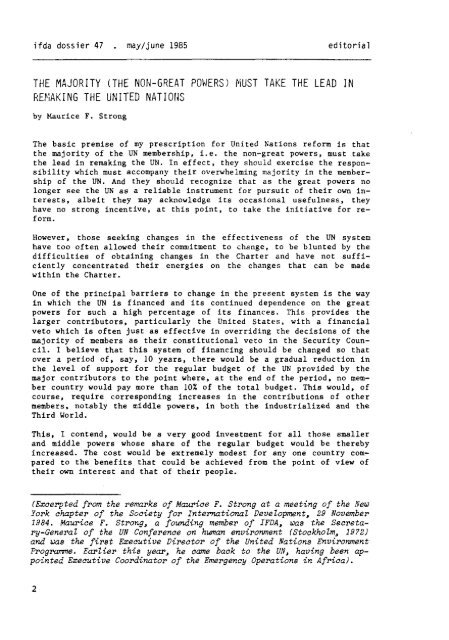Ifda dossier 47, May/June 1985
Ifda dossier 47, May/June 1985
Ifda dossier 47, May/June 1985
You also want an ePaper? Increase the reach of your titles
YUMPU automatically turns print PDFs into web optimized ePapers that Google loves.
ifda <strong>dossier</strong> <strong>47</strong> . may/june <strong>1985</strong> editorial<br />
THE MAJORITY (THE NON-GREAT POWERS) MUST TAKE THE LEAD IN<br />
REMAKING THE UNITED NATIONS<br />
by Maurice F. Strong<br />
The basic premise of my prescription for United Nations reform is that<br />
the majority of the UN membership, i.e. the non-great powers, must take<br />
the lead in remaking the UN. In effect, they should exercise the respon-<br />
sibility which must accompany their overwhelming majority in the member-<br />
ship of the UN. And they should recognize that as the great powers no<br />
longer see the UN as a reliable instrument for pursuit of their own in-<br />
terests, albeit they may acknowledge its occasional usefulness, they<br />
have no strong incentive, at this point, to take the initiative for re-<br />
form.<br />
However, those seeking changes in the effectiveness of the UN system<br />
have too often allowed their commitment to change, to be blunted by the<br />
difficulties of obtaining changes in the Charter and have not suffi-<br />
ciently concentrated their energies on the changes that can be made<br />
within the Charter.<br />
One of the principal barriers to change in the present system is the way<br />
in which the UN is financed and its continued dependence on the great<br />
powers for such a high percentage of its finances. This provides the<br />
larger contributors, particularly the United States, with a financial<br />
veto which is often just as effective in overriding the decisions of the<br />
majority of members as their constitutional veto in the Security Coun-<br />
cil. I believe that this system of financing should be changed so that<br />
over a period of, say, 10 years, there would be a gradual reduction in<br />
the level of support for the regular budget of the UN provided by the<br />
major contributors to the point where, at the end of the period, no mem-<br />
ber country would pay more than 10% of the total budget. This would, of<br />
course, require corresponding increases in the contributions of other<br />
members, notably the middle powers, in both the industrialized and the<br />
Third World.<br />
This, I contend, would be a very good investment for all those smaller<br />
and middle powers whose share of the regular budget would be thereby<br />
increased. The cost would be extremely modest for any one country com-<br />
pared to the benefits that could be achieved from the point of view of<br />
their own interest and that of their people.<br />
(Excerpted from the remarks of Maurice F. Strong at a meeting of the New<br />
York chapter of the Society for International Development, 29 November<br />
1984. Maurice F. Strong, a founding member of IFDA, was the Secreta-<br />
ry-General of the UN Conference on human environment (Stockho h, 19721<br />
and was the first Executive Director of the United Nations Environment<br />
Progranme. Earlier this year, he came back to the UN, having been ap-<br />
pointed Executive Coordinator of the Emergency Operations in Africa).
















